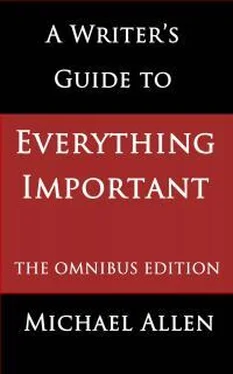1. Describe the stimulus which kicks off the whole emotion; in this case, describe the man coming through the door with a gun in his hand.
2. Describe the clash of desires going on in the head of the sympathetic character, who in this case is the bank clerk. She wants to save her own skin, but she also wants to protect the bank’s assets, because she’s a really good employee. The period of time during which the character reviews the options and decides (naturally) to be a heroine may be quite short, but it involves conscious thought and Uzzell refers to it as the reflective delay.
3. Describe the physical responses which result from the thought processes, and the action which follows. If there is time, for instance, our heroine may imagine the gunman’s bullet tearing through her, and she may start to tremble violently. Then she decides to take the gun off him; or duck for cover; or whatever.
If you want to know any more about Uzzell’s theories you’ll just have to hunt down a copy of one of his two books on technique.
I have, incidentally, chosen to illustrate my description of theory and practice with a rather down-market, commercial-fiction example. But all the principles hold good, of course, however intellectual and literary your purpose and your ambitions may be.
It is worth noting, in passing, that Uzzell took the view that the James-Lange theory of emotion was, so to speak, good enough for practical purposes. He argued that the internal clash of desires, occurring in the mind of the individual, led to action, which led to physical sensations, and that these physical sensations constituted the actual emotion. To Uzzell, the very essence of emotion seemed to be an awareness of bodily changes and sensations, and he emphasised the need to describe these sensations and changes fully if the reader is to become enthralled by a work of fiction.
12. There are no Great Novels
The theory of emotion which is expounded in the previous sections has a number of interesting implications. Here is a discussion of the first of them.
Almost every teacher and lecturer in the field of English literature will seek to convince you that there is something called a Great Novel.
The alleged great novel may be, for instance, James Joyce’s Ulysses , a book which, it so happens, I much admire; or it may be D.H. Lawrence’s Sons and Lovers , a book which, it so happens, I find unreadable.
According to the professors and opinion-setters of our time, the great novel somehow has a stature all of its own; it remains a great book whether you happen to enjoy it or not. In fact if you, as an individual, happen to consider the great novel excruciatingly dull and boring, then it is you, the moron, who is at fault. The novel in question allegedly remains a great novel, regardless of whether or not you – the individual reader – have the good taste and intellectual equipment to recognise it as such.
Nonsense, is my view. I know of no argument which constitutes grounds for believing these ideas to be true, and I can put forward a strong case for believing the opposite.
Consider what we know so far about the novel.
If the novel is anything at all, it is a machine for creating emotion in the reader. Reading a novel may, conceivably, leave you better informed about hotel management or fetishistic sex, but readers do not, on the whole, buy and borrow novels in order to enhance their stock of general knowledge; consciously or unconsciously, they read novels in order to be made to feel. The main function of a novel – any novel – may therefore be said to be the generation of emotion in the reader. This is true whether the reader understands what is happening to her or not.
And what have we learnt about the generation of emotion?
We know that, in order for us to ‘get the joke’ – if we are to feel amusement, and if we are to laugh – we have to be able to speak the right language; furthermore, we need to have the right frame of reference. To understand a joke which is told in English, we need to speak English. To understand a joke told in English about Holmes and Watson, we need to know who Holmes and Watson are.
If we are German, or Japanese, and if we are Nobel-prizewinning chemists, are we necessarily intellectually inferior because we don’t speak English, and because we have never heard of Holmes and Watson? I don’t think so. We may, in fact be extremely bright and well educated.
Those persons who do not ‘get’ the joke about Holmes and Watson – and I have no doubt that there are many millions of them – cannot be said in any meaningful way to be stupid, ignorant, or lacking in taste. They are simply people who do not speak the necessary language and who do not possess the necessary frame of reference in order to appreciate the joke.
Exactly the same can be said, of course, about the communication of emotion via Ulysses , Sons and Lovers , and any other book which is held by the so-called authorities to be a great novel.
13. A brief excursion for ammunition
At this point we need to make a brief excursion into the fields of quantum mechanics and information theory. But fear not. It’s all quite simple really.
In 1927, Werner Heisenberg pointed out a particular limitation of science. Heisenberg realised that if you wanted to know the precise location of an electron, you had to make it visible, so to speak, by bombarding it with electromagnetic radiation.
Unfortunately, when you bombarded the electron in this way, you also shifted its position. Hence you could find out where it was after you had ‘shone a light’ on it, but you could never know where the elusive thing had been while it remained in darkness, so to speak. This circumstance is known as Heisenberg’s Uncertainty Principle.
Please note that the observer who examines an electron does not give ‘reality’ to that entity; but the act of observing does change the system.
In itself, the uncertainty principle does not seem to be all that big a deal, at least to the layman; it doesn’t seem to have much to do with the price of fish. But it turns out that the principle has some profound implications in philosophy and science.
For example, Karl Marx and his communist colleagues had argued that a number of political developments were absolutely certain to occur in capitalist societies. Certain to occur, please notice, without any mights and maybes. Armed revolution by the working classes, for instance, was historically inevitable, at least according to Marx; you couldn’t do anything to prevent it even if you wanted to.
However, when armed with the uncertainty principle, a number of critics of communism, notably Karl Popper, were able to demonstrate that the Marxists’ claims were fundamentally unsound. Marxism, it turned out, was no more scientific than any other set of preferences or ideas about how things might happen in the future.
Popper was also able to show that Freud’s ideas on psychoanalysis were distinctly less scientific and ‘certain’ than some enthusiasts had claimed. For a long time, Freud’s supporters had managed the neat dodge of labelling any sort of criticism of their theories as being motivated by neurosis; hence, they argued, criticism of Freud’s theories merely constituted further proof of how right those theories had been all along. In the end, this argument was recognised as specious.
To summarise: the important thing to note, from a writer’s point of view, is that, in quantum mechanics, the observer has an effect on reality.
Next we need to have a brief look at information theory.
Information can be described as ‘the difference’. For example, there is a difference, to most observers, between (a) the sky and (b) the grass in a field below the sky. A scientist and a cow can both see this difference.
Читать дальше












